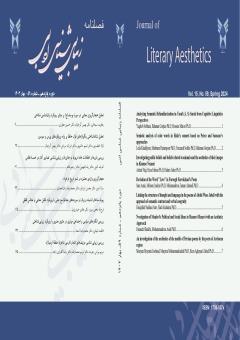Examining the political and social ideas of Molavi in Masnavi Ma'navi with an aesthetic approach
Subject Areas :fateme sheikhy 1 , mohamadreza asad 2 *
1 - Arak Islamic Azad University
2 - arak
Keywords: Aesthetics, social mysticism, politics, social sciences, Mawlawi's masnavi,
Abstract :
In this research, an attempt has been made to investigate the social mysticism of Mawlawi's spiritual masnavi with an aesthetic approach, with a new perspective and using a descriptive and analytical method. Social mysticism is a mysticism that has distinct social strains from the beginning to the end, and in the final stage of the journey, that is, in the fourth journey of the Arbaah journeys, which is intuition, it finds a social nature and the mystic has the mission of guidance, education and social management in different dimensions. He undertakes according to the existential and objective requirements. Therefore, in this research, Molavi's views on political and social approaches have been analyzed on an aesthetic basis. In addition to being a rich source of mystical and political insights and thoughts, Masnavi Manavi conveys social and political thoughts beautifully to the audience with poetic language and informative stories. By maintaining his position and using aesthetic components in the field of language and expression, images and symbols, form and structure, allegory, themes and music of speech, Molvi, as a social reformer, attacked the institution of political governance of the society. Addresses and encourages and warns in order to better advance the affairs of society and the mass of people. In fact, in his educational system, Maulvi tries to spread the principles and issues of Islamic mysticism in the social life style in his educational system, in order to have a monotheistic tendency towards society and governance, in the direction of reforming
اعراب شیبانی، سلطان (1397)، «شاخصه¬های سیاست در مثنوی مولوی»، سومین کنفرانس توانمندسازی جامعه در حوزه علوم انسانی و مطالعات روانشناسی
تاجدینی، علی (1380)، قدرت سیاسی در اندیشه مولانا، تهران: روزنامه سلام
ترمذی، محمد بن علی (1965)، ختم الاولیا، تصحیح عثمان اسماعیل یحیی، بیروت، مطبعه کاثولیکه
جرجانی، میر سید شریف (1377)، تعریفات، ترجمه حسن سید عرب، تهران، فرزان روز
راغب اصفهاني، حسینبنمحمد (1388)، ترجمه و تحقیق مفردات الفاظ قرآن، ترجمه سید غلامرضا خسروی حسینی، تهران، مرتضوی
روحانی¬نژاد، حسین (1387)، «عرفان، شریعت، فقه»، کتاب نقد، سال دهم، تابستان و پاییز، شماره 47 و 48
رودگر، محمدجواد (1387)، «عرفان و سیاست»، ادیان و عرفان، سال پنجم، بهار، شماره 15
رودگر، محمدجواد (1400)، «عرفان اجتماعی»، تهران، سازمان انتشارات پژوهشگاه فرهنگ و اندیشه اسلامی
فروزانفر، محمدحسن (1389)، شرح مثنوی شریف، تهران: علمی و فرهنگی
کاشانی، عزالدین محمود (1381)، مصباح الهدایه و مفتاح الکفایه، علامه جلال الدین همایی، تهران، موسسه نشر هما
لاهیجی، محمد (1371)، مفاتیح الاعجاز، به کوشش محمدرضا برزگر خالقی و عفت کرباسی، تهران، زوار. مجلسی، محمدباقر (1403)، بحار الانوار، بیروت، دار إحياء التراث العربي
محمدزاده، مریم (1388)، «نقد قدرت از دیدگاه مولانا در مثنوی»، پژوهشنامه فرهنگ و ادب، پاییز، شماره 9
مزرئی، رسول (1392)، «بررسی علل و عوامل ظهور اجتماعی نخستین طریقه¬های تصوف»، حکمت عرفانی، سال دوم، شماره اول، بهار و تابستان
مکی، ابوطالب (1306ق)، قوت القلوب، مصر، دار صادر، المطبعه المیمنیه
هجویری، ابوالحسن علیبن عثمان (1390)، کشف المحجوب، مصحح محمود عابدی، تهران، سروش

